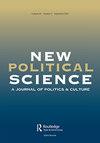The Ambiguous Role of (Eco)populism in the Work of Timothy Luke
IF 0.5
Q4 POLITICAL SCIENCE
引用次数: 1
Abstract
Abstract The concept of “eco-populism” has been used by the political theorist Timothy Luke to designate the possibility of open-ended green political futures which might be constructed beyond the limited ecological imaginaries of technoscience, neoliberalism, and Marxism. This article interrogates the conceptual origins through which “eco-populism” became the preferred name for this alternative. Eco-populism is taken to rightly critique some of the class characteristics of ecological destruction, but it obscures their extension into the realms of reactionary politics, private property, and North American agrarian settler colonialism. This article develops an immanent critique of the formal limits of populism, while also demonstrating its historical formation in the US steers it away from more radical orientations towards climate justice.(生态)民粹主义在路加福音中的模糊作用
政治理论家蒂莫西·卢克(Timothy Luke)使用“生态民粹主义”(eco-populism)这一概念来指出一种开放式绿色政治未来的可能性,这种未来可能超越技术科学、新自由主义和马克思主义的有限生态想象。本文探讨了“生态民粹主义”成为这一选择的首选名称的概念起源。生态民粹主义被用来正确地批判生态破坏的一些阶级特征,但它掩盖了它们向反动政治、私有财产和北美农业移民殖民主义领域的延伸。本文对民粹主义的形式局限性进行了内在批判,同时也展示了其在美国的历史形成,使其远离更激进的气候正义取向。
本文章由计算机程序翻译,如有差异,请以英文原文为准。
求助全文
约1分钟内获得全文
求助全文

 求助内容:
求助内容: 应助结果提醒方式:
应助结果提醒方式:


